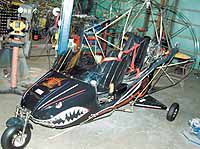| The Evolution is the first powered parachute of its kind, designed with stronger materials and better components than other PPCs. Wings & Things owners are currently announcing the availability of the machine to the market. |
Powered parachutes (PPC) have been around since the early 80s and have always been a popular hobby for flight enthusiasts in the East.
But now, with the PPC bug migrating to the West, it has become essential that a new, more powerful machine be designed that can handle the high elevations of this mountainous region.
Luckily, Westerns won’t have to wait; that “mountain machine” already exists in Spring Glen and is ready to be introduced to the market.
For the last three years, Wings & Things, Inc. owners David Barnes, Keven Mortensen and Paul Peterson have been creating a PPC unlike any other that has ever been designed.
The Evolution is constructed of stainless steel tubing and is jig welded, as opposed to most PPCs, which are made of aluminum tubing.
The design of the PPC had to be completely reinvented by the group to accommodate the heavier stainless steel construction, a concept which critics said could never work.
“No one has ever done this,” Barnes commented. “We were pioneers all the way through.”
The Evolution comes assembled by Wings & Things, rather than coming as a kit which must be assembled by the buyer.
As a result, the Evolution is a lot stronger and safer than any other PPC on the market, according to the group.
The Evolution also carries an 80 horsepower, air cooled four-stroke engine with a direct drive propeller, which the company orders from Australia.
Most PPCs run on a two-stroke engine.
According to the Wings & Things website, “The 2-stroke engines, which are the standard, have become quite reliable and trouble free but as the PPC flying and buying public demands more power, longevity and more features, these 2-stroke power plants have become increasingly heavy and more complicated, not to mention more expensive to buy and maintain.”
| Barnes, Mortensen and Peterson took many test rides with the Evolution to assure the solidity of its design. |
With all of the added features and hand-crafted elements of the Evolution, the price does increase over other models.
The Evolution’s retail cost of $29,900 is one of the more expensive price tags on a PPC.
“We’re more expensive. Ours is about twice the price but about three times the airplane,” Barnes noted. “That’s why it’s more expensive. We put it together and we test it. It’s not gonna break and it’s not gonna bend.”
It is legal to take off from the airport, although very little room is needed and any area with a flat ground would work.
Learning to fly a PPC is simple and it is very easy to control.
“You’re just flying a parachute,” Peterson adds.
The group will build according to orders, allowing buyers to choose colors and look of their new machine.
The machine travels at about 28-30 miles per hour, making for leisurely rides where the driver can enjoy scenery and even snap photos.
“It’s not a go-some-place thing,” Peterson commented. “It’s a for fun thing.”
Mortensen has piloted the machine up to an elevation of 9,500 feet and said it could likely go much higher.
The designers said they believe the machines could soon be used in the field of search and rescue.
Because of the small size, maneuverability and slow speeds of travel, the vehicle would be ideal for traveling at low elevation and weaving through various terrain.
For more information on the Evolution and Wings & Things, visit the groups website at www.wingsnthings.us

